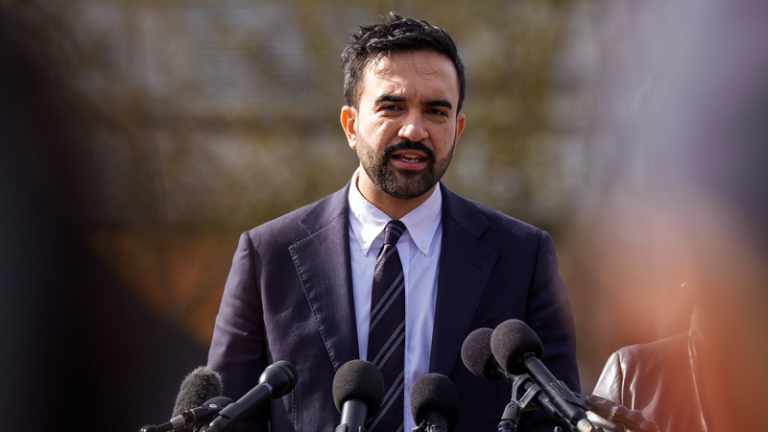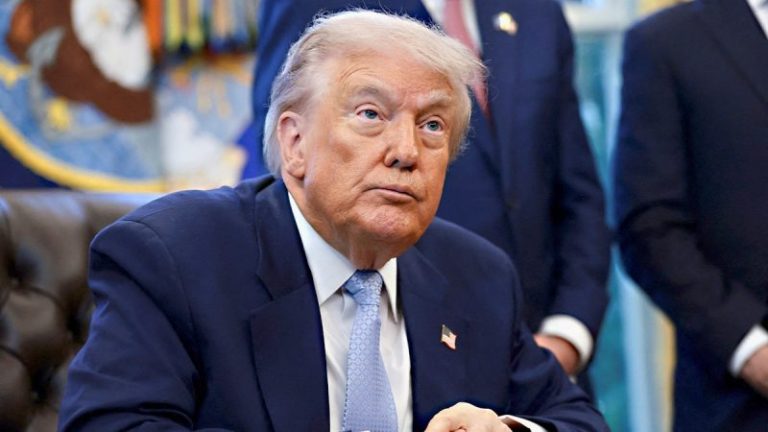The FBI came to the conclusion that Butler, Pennsylvania, would-be assassin Thomas Matthew Crooks acted alone — after a massive team doggedly pursued interviews with thousands of foreign and domestic individuals as part of an unprecedented global investigation into the 2024 shooting of President Donald Trump, the bureau told Fox News Digital as part of a lengthy, behind-the-curtain rundown of the probe.
FBI Director Kash Patel, FBI Deputy Director Dan Bongino and a senior official with direct involvement in the Butler, Pennsylvania, investigation sat down for an unprecedented interview with Fox News Digital for more than an hour Thursday afternoon at FBI headquarters.
Patel told Fox News Digital that the investigation was a ‘Day One priority’ for the bureau.
‘Dan and I have been on this since we got here eight months ago. We not only had to maintain the chain of command to President Trump, but we had to remind the world that President Trump was the victim — one of the four victims — on that day,’ Patel said. ‘There are victims’ rights rules that apply to him, and they don’t get erased because he is the president.’
‘We fully briefed the president, as a victim of this case, at the White House, providing him with all of the details of our investigation, and the president was satisfied with the results and where we left it,’ he said.
Patel, Bongino and the senior official, who has requested anonymity due to his sensitive work, shared new details of the monthslong investigation in an effort to provide maximum transparency to the American people amid recent reports that have suggested several theories, which Patel, Bongino and the official debunked.
‘We have reviewed this case over and over — looked into every nugget. We have spoken to the families, the president — there is no cover-up here,’ Bongino told Fox News Digital. ‘There is no motive for it, there is no reason for it.’
Patel referenced former FBI Director Christopher Wray’s testimony to Congress in 2024 as a potential reason for unfounded theories to surface.
‘My predecessor went to Congress and said he didn’t know if it was a bullet that hit President Trump in the head. The whole world knew it was a bullet,’ Patel told Fox News Digital. ‘For the number one law enforcement officer to say that — it causes a massive disbelief in the institution that Dan and I are now running.’
‘But that is the difference between then and now,’ he said.
The case currently sits in a ‘pending, inactive’ status, but the official called the investigation ‘one of the largest mobilizations of FBI resources in history that, frankly, continued to this day.’
‘If we get a credible lead, we’ll continue to investigate,’ the official said. ‘The director has been very clear about leaving no stone left unturned, and that is what we are committed to.’
On July 13, 2024, Crooks, age 20, opened fire at Trump’s campaign rally in Butler, Pennsylvania. The president was shot, with the bullet piercing the upper part of his right ear.
The president ducked to the ground and was surrounded by Secret Service agents who evacuated him from the scene.
Three spectators were hit by gunfire, and one person, a firefighter and father, Corey Comperatore was killed.
The FBI took over the investigation hours after the shooting, and began investigating it as an assassination attempt.
‘Four hundred and eighty-five FBI employees have been involved in some way, shape or form in this investigation,’ the official told Fox News Digital.
‘The FBI around the world has conducted more than 1,000 interviews connected to this case,’ the official continued. ‘We’ve reviewed 2,000 tips that were submitted. We’ve served and executed more than 10 search warrants and 100 subpoenas. In that, we specifically analyzed 13 electronic devices that were associated with Crooks and his family members from his home in Bethel Park, Pennsylvania.’
The official said the FBI examined ’35 accounts linked to Crooks, including social media, bank and other online accounts.’
‘The FBI has been able to access all of the accounts,’ the official said. ‘There has been reporting to inappropriately and incorrectly state that there was encryption that the FBI was not able to get into — that is not true. We have been able to get into every single account.’
The official said that Crooks maintained foreign-based email accounts from Germany and Belgium.
‘The FBI was able to fully access those accounts within days of the attack,’ the official said. ‘Additionally, the FBI engaged with foreign partners who also provided all of the content of those email accounts.’
‘We can say with confidence that there is no communication, there are no emails that Crooks had that we have not been able to access,’ the official said.
‘The home was completely swept. Every device in the home was collected and accessed fully,’ Patel said. ‘Reports say that we didn’t get into certain devices? That’s false. We got into all of the devices.’
The FBI conducted a manual review of more than 500,000 individual electronic files and ‘engaged with a number of nations around the world to ensure that all leads were covered.’
‘When there was a lead about an overseas connection — the two instances where we became aware of the foreign accounts — the FBI reached out to foreign governments,’ the official explained.
‘Very quickly, they provided the full contents of the accounts,’ the official said, adding that the FBI had deployed ‘such an extraordinary overseas effort that even people not in Crooks’ age range were interviewed and done completely and thoroughly.’
‘There is no foreign connection in this case,’ the official stressed. ‘There is no individual that is outside U.S. borders or inside U.S. borders that had any role in directing him, inspiring him or assisting him in any way — and that includes foreign governments.’
The official added: ‘There is no information, no evidence anywhere in this investigation, that shows there was any foreign individual or foreign government or foreign organization tied to Thomas Crooks.’
‘We would have cracked the biggest investigation in human history — a foreign-directed plot,’ Bongino said. ‘Why would we withhold that? But we can only follow the facts, and they are just not there.’
Reports have surfaced questioning Crooks’ alleged relationship with Antifa-linked individual William Tepes.
The FBI told Fox News Digital that there was never any direct communication between Crooks and Tepes.
‘Crooks posted on YouTube. Tepes is a Norwegian, nordic resistance member. He simply responded to content Crooks posted,’ Patel said, pointing to a comment Tepes made on a 2020-era video posted on the video-sharing platform by Crooks.
As for his online presence, Bongino said previous FBI leadership initially downplayed his digital footprint.
‘The degree of his digital footprint was not messaged correctly at all by prior leadership,’ Bongino said.
The official told Fox News Digital that Crooks’ online activity largely took place in 2019 and 2020, when Crooks was just 16 years-old — nearly five years before the attack.
‘He called our Republicans and Democrats. He went as far as saying, ‘In my opinion, the only way to fight the government is with terrorism-style attacks.’ I won’t try to get into his brain,’ the official said. ‘But there is a limited record of him making political statements and advocating for political violence in 2019 and 2020.’
The official detailed some of Crooks’ online behavior leading up to the attack, including on July 6, 2024, when he used his email account to register to attend the Butler, Pennsylvania, rally on the Trump campaign website. Crooks also searched ‘how far was Oswald from Kennedy?’
The official also said Crooks searched for what the weather would be in Butler, Pennsylvania, on the day of the attack and where the podium would be, and he looked up directions from his home to the Butler Farm Show grounds and directions from the grounds to the closest hospital.
‘But Crooks left no manifesto. He had no seepage of any kind. He didn’t give any indication anywhere that he was going to do this or why he did this,’ the official said. ‘There are many instances in notable assassinations that they do want folks to know why they did it, but we don’t know that here, because Thomas did not leave any of those artifacts.’
‘The rage, the anger, I totally get it. I’m with you. [Trump] is a friend of ours, he was shot in the head on live television — we want an explanation, too,’ Bongino said. ‘Where is the manifesto? The answer is — it doesn’t exist.’
Reports have suggested Crooks had some interest in the ‘furry’ anthropomorphic community online.
But Patel told Fox News Digital that evidence obtained through the FBI’s investigation revealed ‘no evidence’ of involvement in that community.
‘He went on a website, called Deviant.com, and that website contains pornographic material — animated pornographic material related to the furry community — a whole host of things Americans would never look at,’ Patel said, noting FBI evidence that Crooks displayed an interest in ‘animated female muscle-building erotica.’
‘Crooks was on that website and looked at images related to women who work out … a lot. That was his interest, and so we are sharing this with you to show that just because he was on a website that has a voluminous amount of terrible information on it, there is no investigative fact to back up a connection between Thomas Crooks and a portion of the website that had the ‘furry’ on it.’
Patel said questions are also being raised as to why the FBI did not stop the assassination attempt before it happened.
‘The FBI can only investigate based on a lawful predicate to open,’ Patel said. ‘Does the American public really want the FBI scouring social media and content everywhere without a lawful predicate and trampling over First Amendment rights?’
Patel said that if someone had called in a lead, ‘immediately there would be action.’
‘But no one did that,’ Patel said. ‘No one.’
‘People are asking why we didn’t act on his posts on certain sites. No one in law enforcement knew who he was. No one referred him to law enforcement, and we do not monitor every single American’s use of YouTube and Google and Twitter and Facebook,’ Patel said. ‘Because then people come back and say to us: ‘Why are you on our First Amendment rights?’’
As for the weapon used to shoot the president, Crooks used a 223 rifle. Crooks’ father controlled access to the gun vault and the gun.
The weapon was used to fire eight rounds in the vicinity of the president and the stage. The official told Fox News Digital that there were 22 additional unfired rounds in the weapon and a number of unused magazines that were located in his vehicle on a ballistic vest.
The officials all shot down any theories of a potential second shooter, noting that the individual near the water tower around the site was a Pennsylvania State Police officer.
‘There were no phantom rounds. Every single round was accounted for,’ the official said.
Bongino stressed that ‘it is the FBI’s conclusion that Crooks acted alone.’
‘It is our conclusion, and it is likely, given politically motivated assassination attempts in history,’ Bongino said. ‘These are historical incidents that have already happened — Arthur Bremer; (Squeaky) Fromme; Sara Jane Moore; John Hinkley — those names should all ring a bell.’
He added, ‘We’re not saying Crooks didn’t deal with anyone ever — we are just saying that the people he dealt with had no role in inspiring, motivating or directing this attack.’
Meanwhile, the FBI discovered an undetonated explosive device inside Crooks’ vehicle.
‘The device had a receiver on it which would receive a message from a transmitter in order to detonate,’ the official explained. ‘The receiver was positioned in the off position. Had it been positioned in the on position, and if it activated from the triggering device on the person, our assessment is that it would have activated. But the position was in the off position.’
Patel told Fox News Digital that he ‘recreated what it would have looked like if the explosive device was in the on position.’
‘We walked members of Congress through a visual of what would have happened,’ Patel said.
‘Because it seems so unlikely you would build a device and forget to turn it on — but he did,’ Bongino said. ‘That’s how it was found. Was it just stupidity?’
As for the crime scene in general, Patel, Bongino and the official explained that the FBI controlled the crime scene from July 14, 2024, at midnight until July 18, 2024.
‘We do not hold the crime scene forever. We have to give it back — that is standard operating procedure,’ Bongino said.
Crooks’ body was removed from the roof by the Pennsylvania state coroner. In coordination with State Police, the FBI then ‘cleaned the roof with water, as we were going to release the scene.’
‘We had onlookers and souvenir hunters — the FBI is not going to turn over a blood-stained roof. AGR was a functioning business,’ the official said. ‘Our standard operating procedure is to acquire services to clean the roof. The decision was made to do that, but only after all evidence on the roof was collected, including the firearm, shell casings, biological samples left behind, photos, blood.’
The official said an autopsy of Crooks was conducted the next day, and an FBI and Pennsylvania State Trooper sat in on the autopsy.
‘Before the body was released to the family, which is protocol in every crime incident ever, the FBI collected DNA — fingernails, hair samples, and blood from Crooks, that remains in FBI evidence to this day,’ the official said. ‘After those collections were made, our examination of the body was done and completed. At that point, it was turned over to the family for burial and for plans they had.’
The official added: ‘They chose to cremate.’
‘The FBI did not make the decision to cremate the body,’ Bongino said. ‘The family did. It was their son. The FBI had nothing to do with this decision at all.’
Meanwhile, Patel addressed criticisms from members of Congress who claim he has not turned over documents pertaining to the probe.
‘Congress is accusing us of not turning over all of this stuff — but all of this stuff doesn’t exist. It is an empty narrative they’re firing into a vacuum,’ Patel said. ‘The very limited information we have not turned over is respective to victims’ rights. There isn’t some trove of documents that we haven’t sent over there.’
Patel said the FBI has ‘fully debriefed the lawmakers.’
‘We’ve even had members of Congress come to Quantico in our lab facility there and walk them through the exact investigative steps, the video and audio recordings, the repercussions of the explosion that did not occur that day and how that would have impacted the people that were attending the rally, and so they have been given a full inside view of what we did on those days,’ Patel said. ‘We gave them all of the material we are legally able to give them.’
He added: ‘They have seen video recordings. We’ve literally shown them and delivered them the audio and video recordings — the totality of what we possess. They have that. They have our investigative information. There is nothing more for us to turn over. We don’t have anything else in our holdings.’
The FBI told Fox News Digital that the bureau has turned in more than 1,375 pages to the Senate Judiciary Committee and the Senate Permanent Select Committee on investigations. Those documents include FBI interviews — or 302s — with U.S. Secret Service and state and local police, state and local lab reports, including ballistics, crime scene photos, videos and more.
The total pages produced to the Senate numbered more than 2,750.
‘Come put out 3,000 documents to Congress during his tenure. Wray, in his seven or eight years put out 13,000,’ Patel said. ‘We, in eight months, have put out over 40,000 documents to Congress — to include this, Crossfire Hurricane, Arctic Frost and more.’
‘But there are investigations ongoing surrounding that, so we are working with Congress, not only for constitutional oversight and reform in legislation, but we’re working on the accountability piece, and to do that, we have to run our investigations. And we’re not done.’
Attorney General Pam Bondi said in a Friday statement to Fox News Digital, ‘Under Director Patel and Deputy Director Bongino’s leadership, the FBI is doing tremendous work to investigate the horrific attempted assassination of President Trump that resulted in the heartbreaking murder of Corey Comperatore. We will help prevent what happened in Butler from ever happening again.’
The sit-down interview with Fox News Digital lasted for more than an hour, as Patel, Bongino and the senior official sought to provide as much information as possible on the probe and to debunk the recent public criticism they have faced.
‘We don’t blame people for asking questions,’ Bongino said. ‘The president, the candidate at the time, was shot in the head on live TV. Our position is — please — ask away.’
Bongino added: ‘We are very confident in the outcomes of this investigation. We have pulled on every threat. We are absolutely confident, and if information surfaces, please, immediately get it over to us for instant action.’
‘I would ask the public: What motivation would Kash Patel and Dan Bongino possibly have to hide from their personal friend — not just their boss — the president — information about a crime where he was the victim?’ Bongino asked. ‘I don’t understand what the motivation would be.’
But Bongino quoted a line from the movie ‘A Few Good Men.’
‘No one is interested in guilt or innocence, they’re interested in someone to blame,’ Bongino quoted. ‘The public is pissed off. We get it. We sympathize with you. It couldn’t have just been this guy — it couldn’t have just been this guy — it is. There is no reason I would tell you otherwise.’
‘As to why people keep coming back to this on social media, the reality is, many people make a lot of money on social media pushing conspiracy theories for clicks,’ Patel said. ‘That is a fact.’
As for Trump, he told Fox News’ Brian Kilmeade Friday that he has ‘confidence in Kash, a lot of confidence, and the DOJ, and they are giving me reports, and their reports are seeming to balance out, so I have confidence in these people.’
‘I wasn’t confident with Christopher Wray, but this group, it is a different group,’ Trump said. ‘It’s Kash, as opposed to Christopher Wray, and I have confidence in Kash.’
This post appeared first on FOX NEWS










